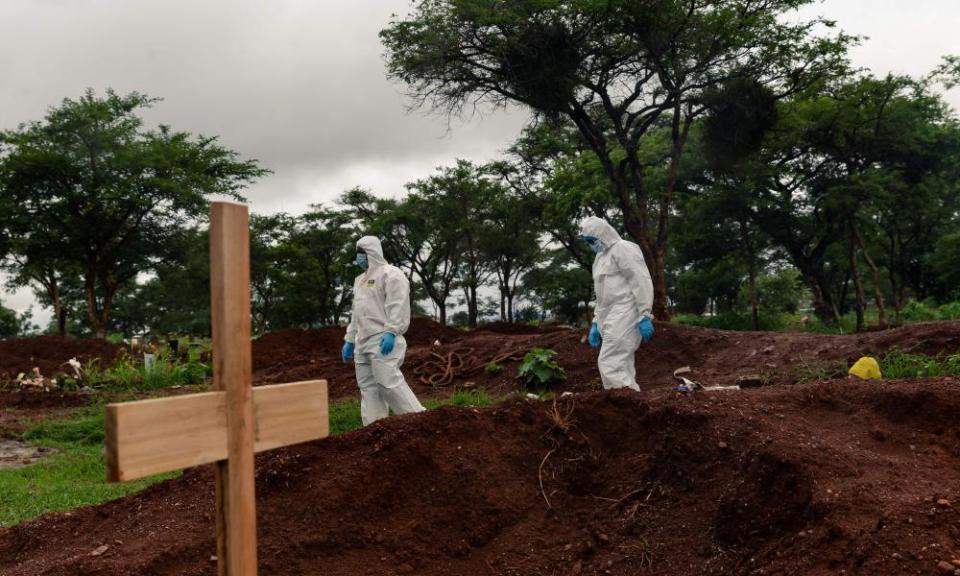Global report: coronavirus death toll reaches 2 million

More than two million people have lost their lives to the Covid-19 pandemic worldwide, with the United Nations secretary general, António Guterres, lamenting the impact of the “vicious virus”.
“Our world has reached a heart-wrenching milestone,” Guterres announced on Friday in a video marking the moment.
“Behind this staggering number are names and faces: the smile now only a memory, the seat forever empty at the dinner table, the room that echoes with the silence of a loved one,” he added, calling for greater global solidarity to fund vaccination efforts and urging citizens to stick to containment measures such as physical distancing and masks.
Data from Johns Hopkins University showed the latest Covid milestone was reached on Friday, with an average of 11,900 daily deaths being recorded in 2021 so far, according to Reuters – representing somebody currently dying every eight seconds because of Covid.
The global death toll hit one million in late September, nine months after the new coronavirus was first detected in the Chinese city of Wuhan. Disturbingly it has taken just over three months for that number to double, with some of the worst hit countries – including the US, Brazil, Mexico and the UK – witnessing a surge in infections and deaths.
“What was never on the horizon is that so many of the deaths would be in the richest countries in the world,” said Dr Bharat Pankhania, an infectious diseases expert at the University of Exeter. “That the world’s richest countries would mismanage so badly is just shocking.”
The US has the world’s highest official death toll and, with more than 386,000 fatalities, accounts for one in every four deaths reported worldwide each day.
The next worst affected countries are Brazil, with more than 207,000 deaths; India with 152,000; Mexico with 138,000; and the UK with more than 86,000.
Together those five countries contribute to almost 50% of all Covid-19 deaths in the world but represent just 27% of the global population, Reuters reported.
Europe, the worst-affected region in the world, has reported more than 615,000 deaths so far and accounts for nearly 31% of all Covid-related deaths globally.
Infection figures are also still soaring in countries including Mexico, which posted a record 21,366 new infections on Friday, around double the daily rate of increase of just a week ago. Brazil, where the city of Manaus was running out of oxygen to treat Covid-19 patients, recorded 69,198 new infections in the previous 24 hours.
China, where the disease was first detected, said 130 new cases had been recorded on Friday, as authorities continued to battle a severe outbreak in the north-east that has put more than 28 million people under lockdown.
Total case numbers remain well below what China saw at the height of the outbreak in early 2020, but concerns about a new country-wide wave are growing with a major national holiday a month away and estimates of 296 million railway passenger trips during the lunar new year break.
In his statement marking two million deaths, Guterres urged world leaders to “boost vaccine confidence and knowledge with effective communication grounded in facts”.
Related: Global immunisation: low-income countries rush to access Covid vaccine supply
But that is not happening everywhere. In Brazil, where an average of more than 1,000 people are dying each day, President Jair Bolsonaro has repeatedly questioned the safety of vaccines and said he will refuse to be vaccinated himself.
“Nobody will be forced to get vaccinated,” Bolsonaro vowed this week during an internet broadcast. “If you don’t want it, don’t have it. That’s your right. After all … we don’t have proof [they are safe].”
According to the University of Oxford, 35 million doses of various Covid-19 vaccines have been administered around the world, many of them in rich countries such as the UK.
On Friday the British prime minister, Boris Johnson, claimed “the biggest and fastest vaccination campaign in our history” was under way, adding: “The chances are that you know someone personally who has already received a vaccine.”
In the United States, the incoming president, Joe Biden, has unveiled ambitious plans to vaccinate 100 million Americans in his first 100 days in office.
“This will be one of the most challenging operational efforts ever undertaken by our country – but you have my word, we will manage the hell out of this operation,” he said.
India on Saturday launched one of the world’s biggest vaccination programmes, aiming to inoculate a quarter of a billion people in the coming months including healthcare workers, people aged over 50 and those at high risk.
On the programme’s first day 300,000 people were to be vaccinated at 3,000 centres.
But in many developing countries, including Brazil, vaccination has yet to begin, with some specialists convinced government inaction means many countries will fare even worse this year than last.
“Of course the pandemic took the whole world by surprise and killed many people – that’s why you call it a pandemic,” said Mariana Varella, a Brazilian public health writer.
“But we didn’t need to be in the situation we are in, with his number of dead, with the health system overwhelmed.”

 Yahoo Finance
Yahoo Finance 